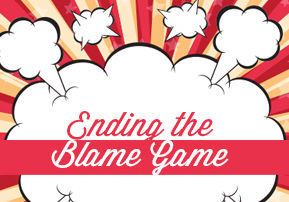
Ending the Blame Game
I hear the bitterness and suffering of people who blame others every day. Their lives are an unbearable torment because they feel that they have no control...

Rabbi Shalom Arush has identified three developmental stages of spiritual development which he calls: Basic Level One Emuna, Intermediate Level Two Emuna and Upper Level-Three Emuna. Basic emuna is the belief that everything that is happening to us is coming from Hashem and not from annoying or upsetting situations with spouses, kids, bosses, neighbors or police officers. People that annoy us are simply being used by Hashem to test our emuna and give us the opportunity to grow. Level-two emuna is the belief that everything that Hashem does, He does for the very best and Level-Three Emuna is the belief that everything that Hashem does He does for a good purpose.
According to Rav Arush when a person has developed solid level-one emuna, they stop blaming their problems and emotional outbursts on themselves and other people. Instead, they go directly to Hashem to fix the problem because they know that He and He alone is the One who sent them the problem in order that they should grow closer to Him.
Think about it – how many people do you know are like this, who never blame themselves or others for the painful, frustrating and sometimes tragic difficulties that they go through but instead see their troubles as a sign that Hashem wants them to rectify something in themselves?
As a psychotherapist and emuna coach, I’ve had the opportunity to speak with a huge number of people  over the years, and believe me – there aren’t many people – “religious” people included – who aren’t still playing the blame game. In truth, what Rabbi Arush refers to as the rock bottom most basic level of emuna is practically non-existent in our generation except for a small number of his students and not even all of his students.
over the years, and believe me – there aren’t many people – “religious” people included – who aren’t still playing the blame game. In truth, what Rabbi Arush refers to as the rock bottom most basic level of emuna is practically non-existent in our generation except for a small number of his students and not even all of his students.
I was speaking with a lady on the phone, last week, who has been a diligent student of Rabbi Arush for years. She reads his books, does more than an hour of personal prayer every day, generously supports our yeshiva, and doesn’t make an important decision in her life without consulting either myself, Rabbi Brody, or Rabbi Arush. Yet this good woman, if I don’t interrupt her, could easily waste an entire hour on the phone telling me how everything that’s wrong with her life is her husband’s fault!
“There is no bigger mistake in the world than to blame others for your anguish,” says Rabbi Shalom Arush. “Blaming anyone for your troubles – no matter who – is a major breach of emuna. This causes a weakening of Divine providence over a person and actually gives power to the very person that you are blaming.” (The Universal Garden of Emuna, p. 73)
How could it be that so many well-intentioned people who learn Torah daily and pray daily and even repent daily are still so far away from not blaming their problems on others or themselves? The answer is that there is a “clever one” inside most people that tells them: “You’re not a rank amateur…you already have emuna!…why waste your time on these baby steps…they’re for beginners…not you. You should be staying up all night and learning Kabbala at your stage.”
Clearly it is nothing but foolish pride and a lack of belief in themselves that drags people into blaming others for their troubles. I hear the bitterness and suffering of people who blame others every day. Their lives are an unbearable torment because they feel that they have no control or influence over other people and don’t know what to do.
There is something they can do, because their lives are not in the hands of other people. They can turn to the Master of the Universe and ask forgiveness for their stubborn pride and for the blaming that they’ve done. They can then beg Hashem for the humility to start to build their emuna the right way from the ground up on a solid foundation. They should go back and internalize the fundamentals of emuna that they are missing. The best way to do this is to read chapter four in the Universal Garden of Emuna daily and pray to live without blaming people for their problems for 30 minutes a day until it stops.
Be honest with yourself. If you’re still playing the blame game and suffering from its poisonous effects on your moods, your relationships, your career and your life, there’s still no reason to despair. Start now by declaring a new beginning (see: The Garden of Wisdom, p. 153) and follow my advice above.
Please also accept as my gift to you the following tool that I developed based on Rav Arush’s teachings. If you will use it on a daily basis I promise you that you will taste the true sweetness of reaching the first level. This is my Basic SWAP tool for people who want to strengthen Level 1 Emuna based on the teachings of Rabbi Arush. SWAP stands for: Stop-Wonder-Alternative-Practice. If you really want to put an end to the crazy eight cycles of blame and want to make solid progress with your life – copy this tool and refer to it frequently. Memorize it if you can and Hashem will help you to SWAP the blame game for a solid relationship with Him and a new beautiful life.
- STOP
- Hashem, I know that I’m not standing before this person I’m standing before You!
- Hashem, I know that this is a test of my emuna.
- There is no one but You, Hashem.
- Please help me put my emuna before my intellect.
- I know my intellect is still very far from Your Truth.
- Wonder
- There is no one but You, Hashem, and only You can help me.
- I am ready to place myself in Your Loving Hands, Hashem, please save me from falling into the hands of human beings.
- If necessary, I’m ready to suffer this anguish, Hashem. If Hashem is using another person to inflict suffering on you, say: “Hashem, I know that You’ve picked this person and he or she is just a stick in Your hand and that I cannot change this person’s ways. I can only improve my ways.
- I therefore blame nobody for this. Nobody is guilty.
- Did I violate one or more of Your Commandments?
- Please forgive me, Hashem, for any misdeeds I committed knowingly or unknowingly.
- Since every sin involves arrogance, please forgive me for my arrogance.
- There is no greater arrogance than my sadness. Please forgive any sadness or other indication of lack of emuna that I have shown.
- I accept that the outcome of this is completely in Your Hands.
- Help me learn from this test or setback.
- I wish to know myself better as a result of this.
- Help me turn this setback into a victory.
- Help me to accept my “failure” and be successful in the future. That way my failure will be a victory.
- Alternative
- If after this, I see I have the option of improving my situation or life in general please help me go forward.
- If I see that I still lack the option to change my situation, I will believe that for the time being You want me to continue as I am and continue praying. May my “failure” atone for times when I didn’t have emuna. Or, alternatively, help me to see that you are preparing me and strengthening me to reach an even higher spiritual plateau. If so, I lovingly accept the waiting period.
- If I have harmed someone I will seek that person’s forgiveness.
- I will donate ____ to charity as atonement for my misdeeds.
- Practice
- Daily personal prayer including: gratitude, renewal, striving for joy, self-strengthening, and review of good points.
- Daily study of Rav Arush’s writings on the above subjects.
- Be honest with yourself and call us for coaching if you need it.











9/13/2017
Bitachon
Hi, I am having a hard time understanding how Emuna levels 2-3 are different from the notion of "Bitachon" as explained in very minute detail in Chaar Habitachon – Hovot Halevavot – R. Béhayé. I hope you will read this.
9/13/2017
Hi, I am having a hard time understanding how Emuna levels 2-3 are different from the notion of "Bitachon" as explained in very minute detail in Chaar Habitachon – Hovot Halevavot – R. Béhayé. I hope you will read this.
9/11/2017
Brilliant!
I've now got the list copied, pasted, and printed. Just what I need, thank you!